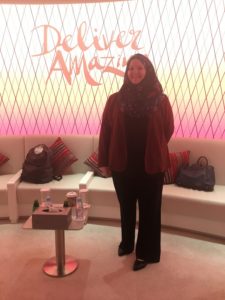April Sanders-Aboulila, an academic advisor in the psychology department at the University of Utah, was awarded a fellowship to spend several days in Qatar to learn about its culture, its government priorities, its economic policies and its relations in world affairs.

The opportunity arose through a fellowship called the Qatar Malone Fellowship “which is a cultural and educational experience through the National Council on U.S.-Arab Relations (NCUSAR) and the Embassy of the State of Qatar to the U.S.,” according to Sanders-Aboulila. The prestigious fellowship is only offered to five American professors and ten students every year. The fully paid fellowship was offered to Sanders-Aboulila who has been a member of the NCUSAR since the start of 2013. The fellowship was also offered to one of Sanders-Aboulila’s students at the University of Utah. The two were able to spend Nov. 16 through the 23 in Doha, Qatar.
The week-long fellowship consisted of many meetings with important officials in Qatar, such as from the Ministry of Foreign Affairs, the Ministry of Defense and the Qatar Financial Center. Additionally, they were able to go to a museum of Islamic Art, experience different activities such as sand dunning and visit companies such as Al Jazeera, a news agency that is “allowed to operate with a greater degree of freedom of expression that the media of many other eastern Arab countries” and is, therefore, an extremely important piece of the society in Qatar. The group was able to meet with Qatari academics, policy-makers and specialists in order to better understand their culture, society, economy and government. Every day of the itinerary was filled with something to do.
The experience was able to offer insight into Qatari culture and life. According to Sanders-Aboulila, the experience was “extremely fulfilling” because of the variety of people that attended and their different experiences and lenses for looking at the situation whether from the lens of education, economics, foreign affairs and geopolitical structures. Following the program, students and instructors are encouraged to share their newfound knowledge based on the experience with the American public through different activities, articles, and interviews.
One way that Sanders-Aboulila will be able to do this and impact students’ lives in the process is by teaching a class next semester called the Model Arab League. In the class, students are able to represent one of the Arab League’s member states and participate in meetings at both the regional and national level. The class is offered every spring semester and is open to students of all majors. Country relations are often difficult to maintain so it is important to create opportunities like this fellowship in order to help to maintain good relations even through differences in culture, politics, economics and government. Qatar’s relationship with the U.S. is “the country’s single most important international strategic relationship.”
When asked what Sanders-Aboulila would want others to know about Qatar, she emphasized that Qatar is a progressing country with a very rich culture. Qatar is a diverse country with a population of 2.6 million and only 300,000 Qataris and is a major player in the Arab world. They have plans in the works to continue to push the country towards further success, such as the Qatar Five Year Plan for economics and Qatar Vision 2030 with an emphasis on education. The country has “a literacy rate of almost 100 percent” and female citizens that are “more educated than their male counterparts.” She continues that “it could be argued that Qatari women are the cornerstone of the society because it is [the woman’s] responsibility to shape her family to be honorable and strong.” Qatar is a leading country in the Middle East because of different programs and especially the Qatar Foundation (QF) which is “a private, non-profit educational based institution” that so far has especially helped several children with learning disabilities and their parents.
While looking to Qatar’s future, Sanders-Aboulila stated, “Qatar is one of the most welcoming societies that I have traveled to … I believe that it will continue to be an emerging society … and will be able to thrive economically, socially and politically.” In her final remarks, she would like to thank the Embassy of the State of Qatar NCUSAR for the opportunity to go because, she adds, it was “one of the most enjoyable experiences that I have had. [Qatar] has a deep heritage and culture that you cannot find in the States. It is definitely an area that I can see myself living and working in the future.”


